Where is Clare?
08/04/2013:
I'm writing what will be the last instalment to the blog (just for the time being I hope) as I'm now back in the UK. My last few weeks in Burundi
were eventful and fun but emotional and challenging as well ...
In terms of work, one of my trainee accountants was off work with malaria which had us worried for a time (I hear he is recovering well)
and meant that I had to change my plan for the last few weeks. I had begun revising salary calculations in February as the income tax law had
changed at the beginning of the year but (understandably) it was taking time to finalise the new figures as changing salaries
is always a sensitive issue. Although I didn't get as far as I would have liked in terms of training my accountants on the new software,
I was able to leave payroll in a far better position than when I arrived; employees are benefiting from the maximum tax free indemnities,
tax and pension contributions are being correctly calculated and payslips have been simplified so that employees now understand how their take home
pay is calculated. However there is still so much that another volunteer could help with, so if anyone is interested then please
get in touch!
My final weekend, after a failed trip to Rwanda due to a car incident, I went to a Kirundi/French/English comedy night! Burundi never ceases
to surprise and amaze me - the bits I understood were hilarious and that club was definitely the place to be that night for young, affluent,
cool Burundians. Though once again the disparity between rich and poor was at the forefront of my mind.
I also took part in a music video! My Burundian family are members of a choir who are making a dvd to sell
in order to raise money for their community and they practice every weekend in our yard. The girls taught me some of the dance moves and
then asked if I would like to appear in the dvd. I said yes of course and cannot wait to see the finished product!
And on the day before I left, my friend Annie gave birth and I got to meet baby Lydia just a few hours before I got on the plane!
Many congratulations to Annie and Danny, and maximum respect for having a c-section in Burundi!
I was having a look through the blog to see what I'd missed out and I can't believe I never mentioned the central market burning down.
The market was one of the few attractions lonely planet listed to visit in Bujumbura and luckily I got to go there twice before disaster struck.
It was a massive hub of activity with easily close to one thousand little lockable stalls.
The fire started early one Sunday morning and air support was needed from Rwanda to tackle the blaze.
Depending what news programme you watched/listened to, there were either no or just a few fatalities but approximately 80% of the market
was destroyed. Many many families lost their livelihoods that day and it is still not clear what kind of support there is for them
(insurance is not a high priroity for many Burundian market traders) however the government is preparing a temporary site for traders whilst
it rebuilds the original site.
Bujumbura really has a lot to deal with at the moment from an infrastructure point of view: here is a picture of the city centre after a
heavy (yet typical) rain storm.
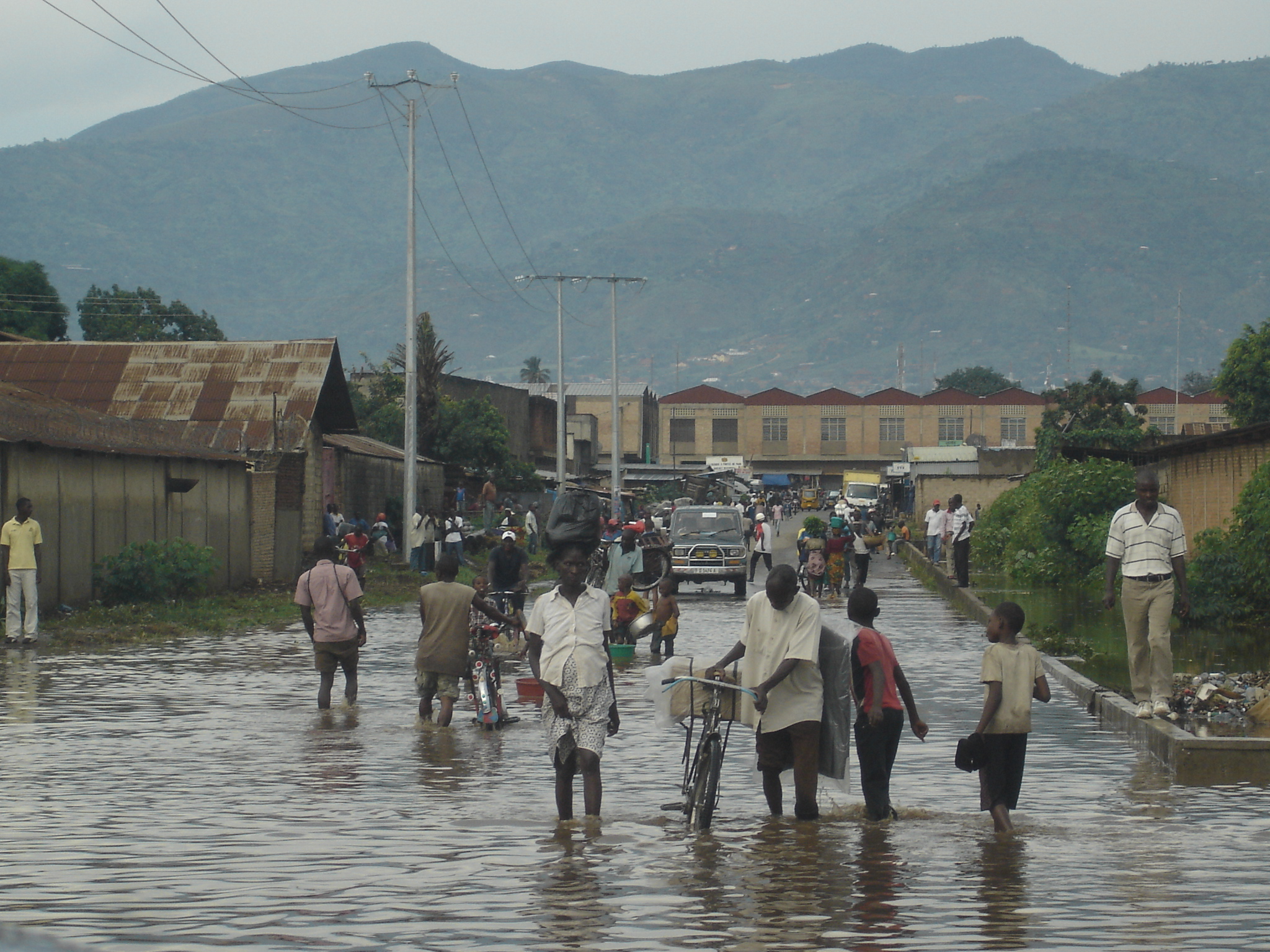
And here are some other random observations I've made about Burundi while I've been here: spiders are huge, oranges are green but they still taste
like oranges, breast feeding in church is normal, buses stop wherever you ask them to, mobile phones have torches on them, girls can't have long hair
if they attend a government school, the borders
are closed between 6pm and 6am, hospitals don't feed patients or wash their sheets - family members come every day with charcoal stoves
and washing bowls, people are capable of carrying phenomenal amounts of stuff on their bikes ...
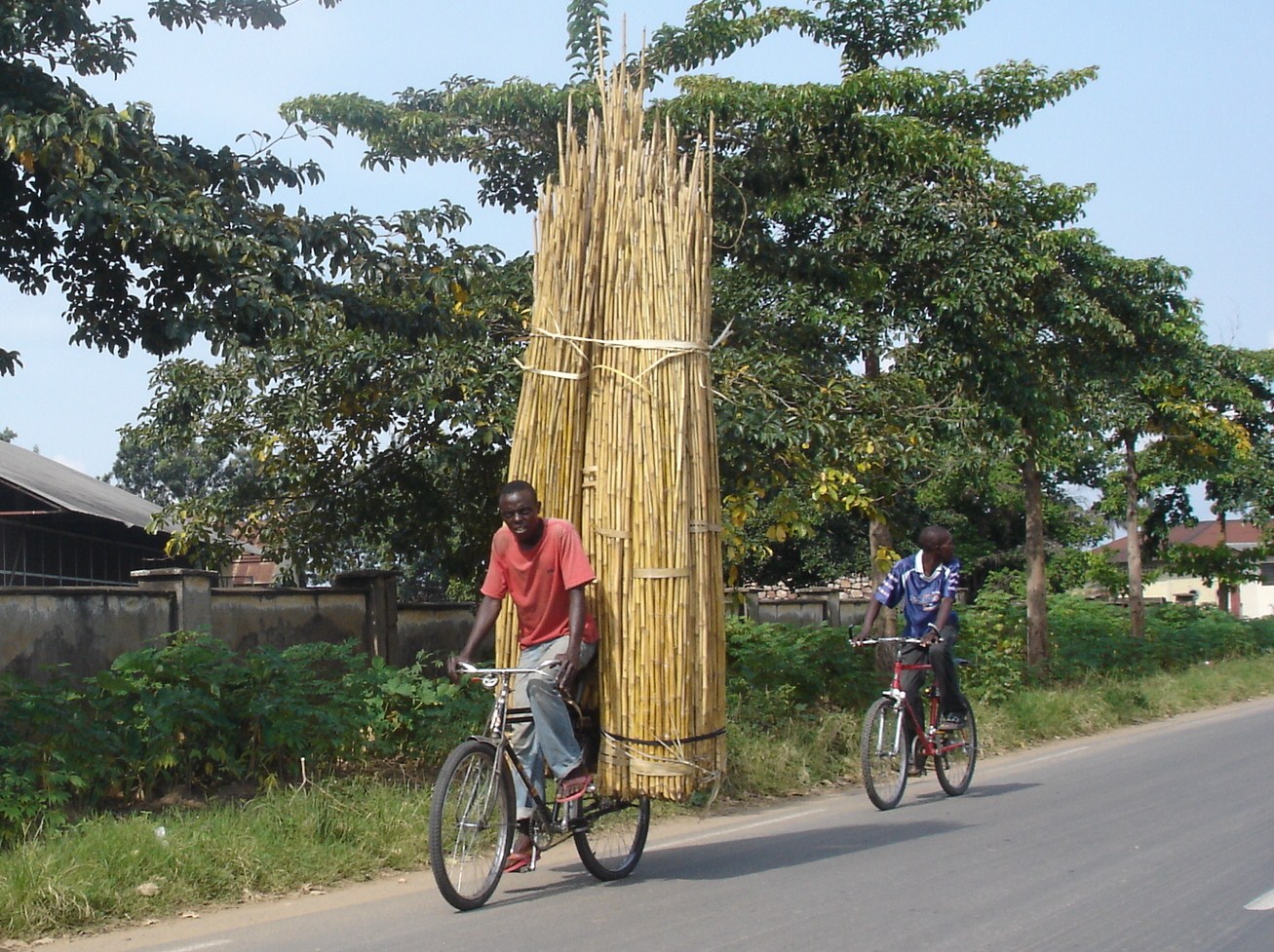
My final thought for you to consider is a little bit controversial; it's about religion and development. Religion is a very important part of most
people's lives in Burundi and I know of many wonderful peace, reconciliation and development projects that have been set up by religious groups.
Some argue that
religious groups have done more for Burundi than traditional NGOs; faith has permitted people to go where many others would not go,
helped them remain
positive in times of real despair and encouraged others to be receptive to their ideas. And from what I have seen, heard and
read in the last three months, I would agree that religion has played a vital role in helping Burundi overcome many of its problems. But I also
wonder whether religion can hinder development; I'm not talking about things like opposing the use of birth control as a means of
population reduction (although that is an important issue), I'm talking more about the extent
to which people believe that everything is "God's doing" and consequently the impact we can have is limited.
Does faith sometimes cause people to not act? This is just a thought and I would be very interested to hear what you have to say about it, so once again
email me!
So I will leave it there. It has been a truly wonderful, enlightening, inspiring adventure and one that I wasn't ready to end just yet.
I have to say some thank you's
before I go;
to my Burundian family
who really were my family and shared every aspect of their lives with me, I feel incredibly privileged; to everyone at
the Communaute des Eglises Emmanuel who worked so hard for me; the Johnsons, Meghan and Rach, and Raquel who are dogle (that word isn't in the dictionary, yet);
to Apeksha at AFID who was always there to support me; and my family and friends back home who always encouraged me!
Hopefully this is not the end, but for now, Amahoro from me, my Burundian family and all the deaf kids ...
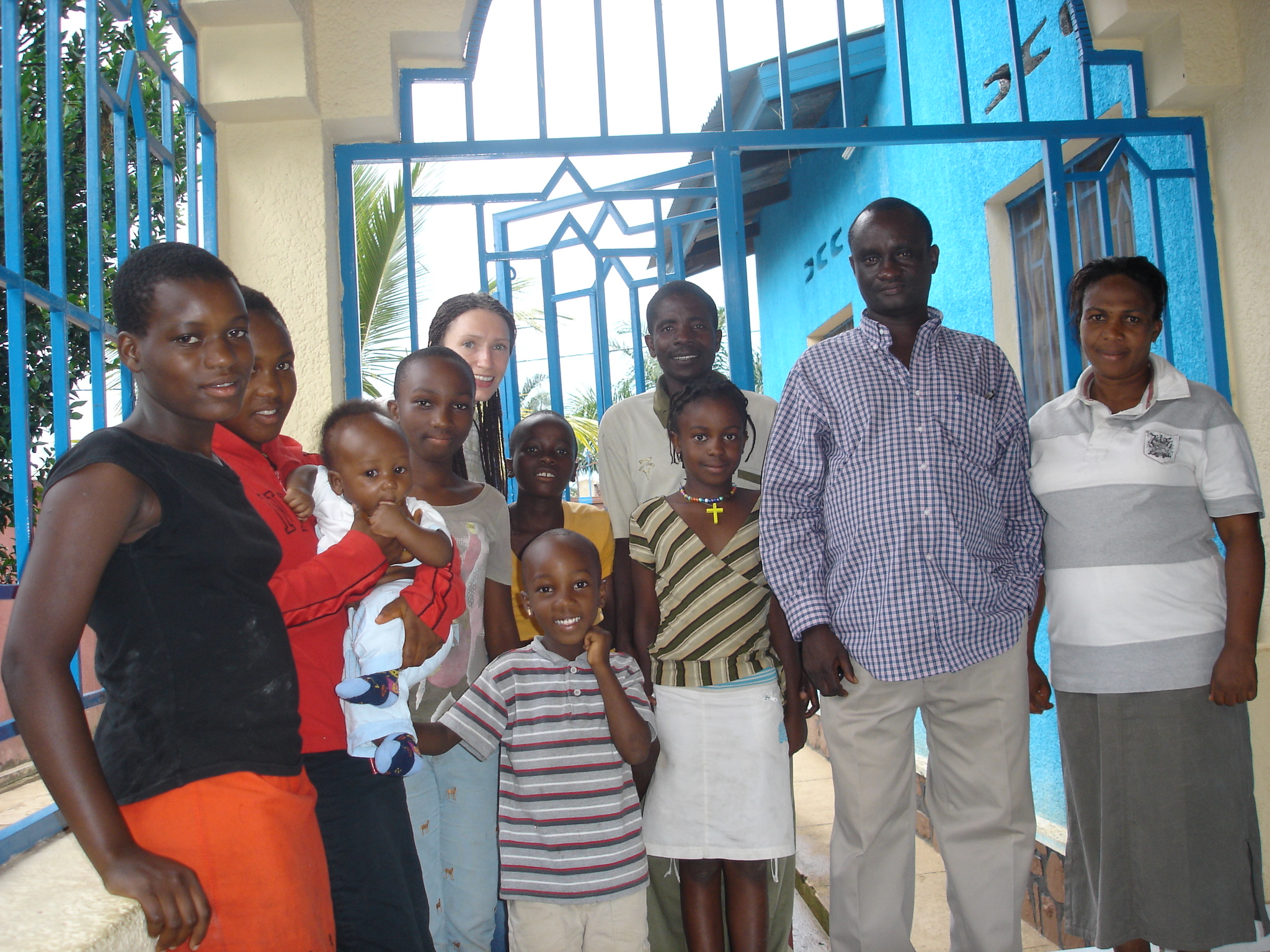

11/03/2013:
Well how about that, two updates in one week!
I wanted to tell you about some of the work related activities I've been up to - don't worry - on this occasion, work talk is interesting
(well I think it is)!
On two occasions now I've been to a village called Gatumba which is between Bujumbura and the border with the DRC to visit two
different organisations. The first is a church run project that secures funding to be used in the treatment of children with disabilities. About
40 children
have been selected to be part of the project and I visited some who were part-way through their treatment and others about to start their treatment.
It was really quite moving to see how happy and hopeful the mothers and children were thanks to the intervention of this project. The second
project deals with human rights and particularly with regard to those who fled the country during the war and are now returning - during the
conflict, peoples' houses were destroyed, land was repossessed and families and communities were torn apart by violence - returnees often have nothing to return
to and are not well informed of their rights. This project provides information and legal support on issues such as land disputes and accessing
government provision of housing and other services for returnees as well as helping victims of violence and trauma.
Meeting the people who ran these projects reinforced to me the need for sound financial management and the role that accountants can play in international
aid and development. I was only able to spend a few hours with each but in that time I realised that they really know their stuff and are so passionate
but could really do with some help in putting together proposals and budgets for potential funders and demonstrating that they can accurately account
for funding they do get. So if any accountants reading this are feeling inspired - there is so much out there to do!
But back to what I am actually here for - back at Ephphatha things are ticking along. Progress across the various projects hasn't been as speedy
as I had hoped - the concept of a cash book in which all transactions in or out of the cash box must be recorded in a timely manner and supported
by appropriate documentation has taken a while to sink in but I think we are getting there now. Reconciliations are reconciling for the most part
but they are taking several attempts (and days) to find missing transactions. We have started generating some reports from the accounting
software and I am really excited about this - I hope they see the value of them both from a control and an information point of view and continue
to generate them after I have gone - I think I will be requesting copies by email!
And as usual I have been debating more development questions with myself and others...
The first is Toms shoes. A good friend of mine shared an article recently which criticised Toms buy one give one policy (for each pair
you buy, a pair is donated to an underprivileged child in a developing nation). It's argument was that donating a pair of shoes helps shoelessness,
not poverty and it actually destroys any local shoe manufacturing in the developing nation as
people will not buy a pair of shoes locally if they know they can get a pair for free. Unless of course Toms had a factory in that country and employed
local people on a fair wage to create the shoes ... currently Toms manufactures its shoes in China and I am sure there are people living in
poverty in China but I don't think they get any free Toms shoes.
I put this argument to a friend out here who is a medical student and he couldn't disagree more. His argument was that for the people without
shoes, financially they are not in a position to buy shoes as any money they have they spend on other more urgent things such as food.
Therefore by Toms
providing free shoes, they are not damaging the local economy and encouraging "laziness" but are actually contributing to
improving peoples' quality of life by reducing the risk of infection through foot injuries caused by not wearing shoes - less infections equals more
productivity equals more income equals improved standard of living.
Let me know if you have any opinions to add!
The second debate is on the most appropriate scale to deliver aid, for example projects like the two mentioned above in Gatumba don't necessarily reach large
numbers of beneficiairies but they understand their beneficiaries very well and are able to provide very appropriate and tailored aid. Furthermore
the impact of the aid provided is potentially more easily and accurately assessed. On the other hand projects run by large NGOs
are able to reach far higher numbers of beneficiaries and offer potentially better value for
money in terms of economies of scale and less wastage of resources due to a more coordinated and less disjointed approach, but is their
approach more of a "one size fits all" that only meets part of most beneficiaries' needs and how much of peoples' donations are
spent on admin costs?
Normally I would google this but the internet (when it
works) is frustratingly slow so I'm putting it to you to do my googling for me - please email me your thoughts and findings! I'm guessing the
ideal would be that the large NGOs use a network of smaller organisations for delivery...
So that is all for now - now I can say I look forward to hearing from you soon rather than it being the other way round!
07/03/2013:
Another three weeks has passed since my last update - I guess that's about as regular as I can manage!
So in the last few weeks I've been getting out and about around Burundi...
I have been to see the most southerly source of the river Nile! It's actually not that impressive to look at as it's a trickle of water
with some artificial pools built around it, but to me and my love of hydrology, rock formations and the rest, I still think it's pretty exciting!
(Mr Purser and the rest of the BHS geography staff would be so proud!).
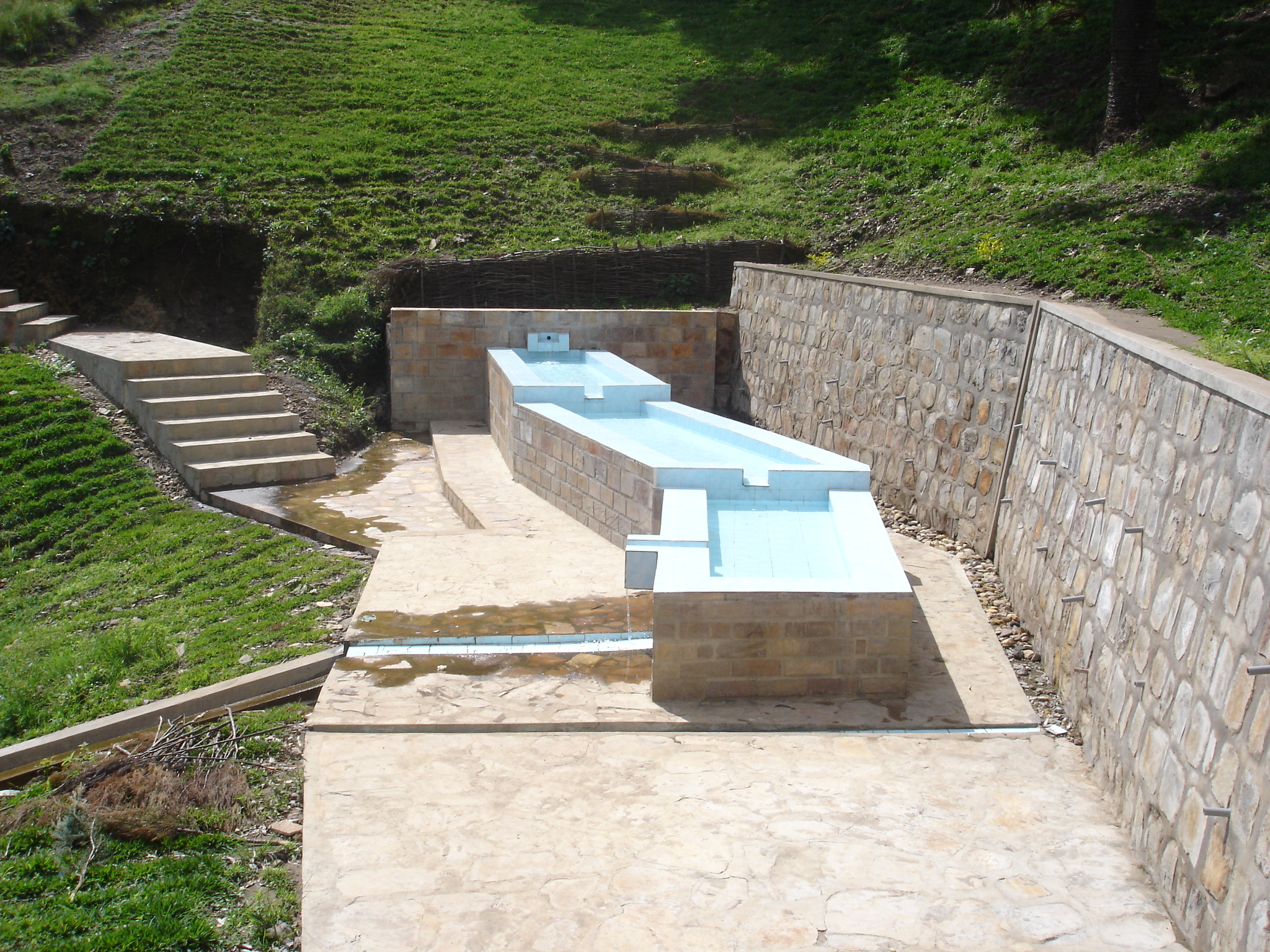
I also went to the Chutes de Karera which are a series of beautiful waterfalls in rural Burundi. They were an absolute mission to get to
(over 4 hours each way, half of which was on
dirt tracks) but it was well worth it. My two American friends and I decided on a whim to go stand under the water fully clothed
which did mean that I wore a blanket as a skirt for the rest of the day but it was a pretty amazing feeling at the time getting soaked by the waterfall...

On the same journey (and along more dirt tracks) we also went to the Failles des Allemands which are spectacular gorges that open into a plateau leading to Tanzania.
For the Red Pointers reading this, this is Burundi's contribution to the world of rock climbing...
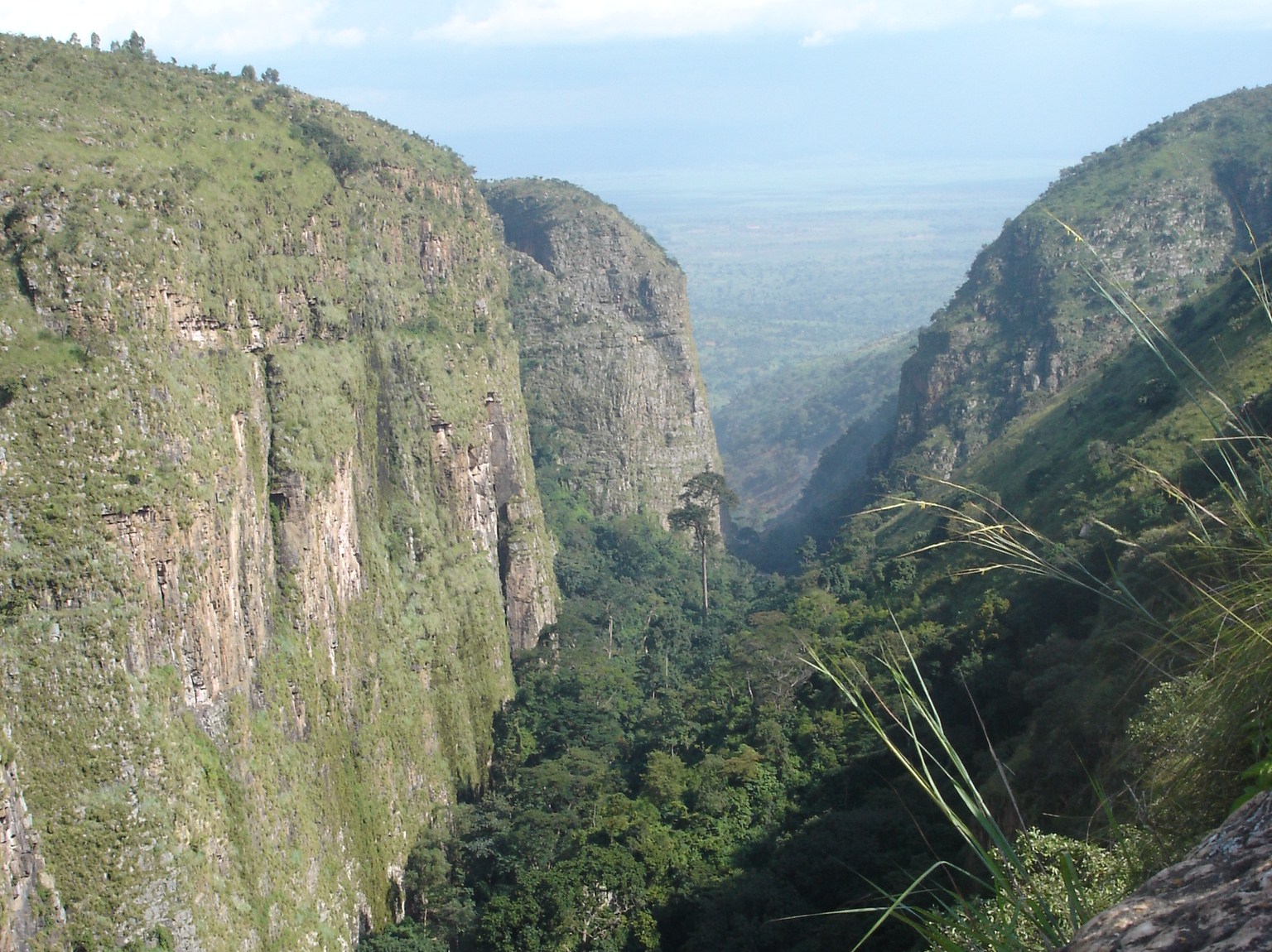
We got home at around 9pm that day and one of my colleagues commented that it was a sign that there was truly peace in Burundi now that people
could make such journeys safely in the dark.
So you can imagine I feel a lot more familiar with Burundi now, to the point that I've had my hair done Burundian style! The comments that
I'm becoming Burundian haven't stopped since ...

I also wanted to introduce you to some of the people I have met since I have been here. You've already seen a few pics of the deaf children
and here is Maurice, the school Director, together with his wife Francoise. I am staying at their home and they have done an excellent job
at making sure I am happy and healthy. Maurice's support as also been invaluable when it has come to implementing changes to accounting processes.
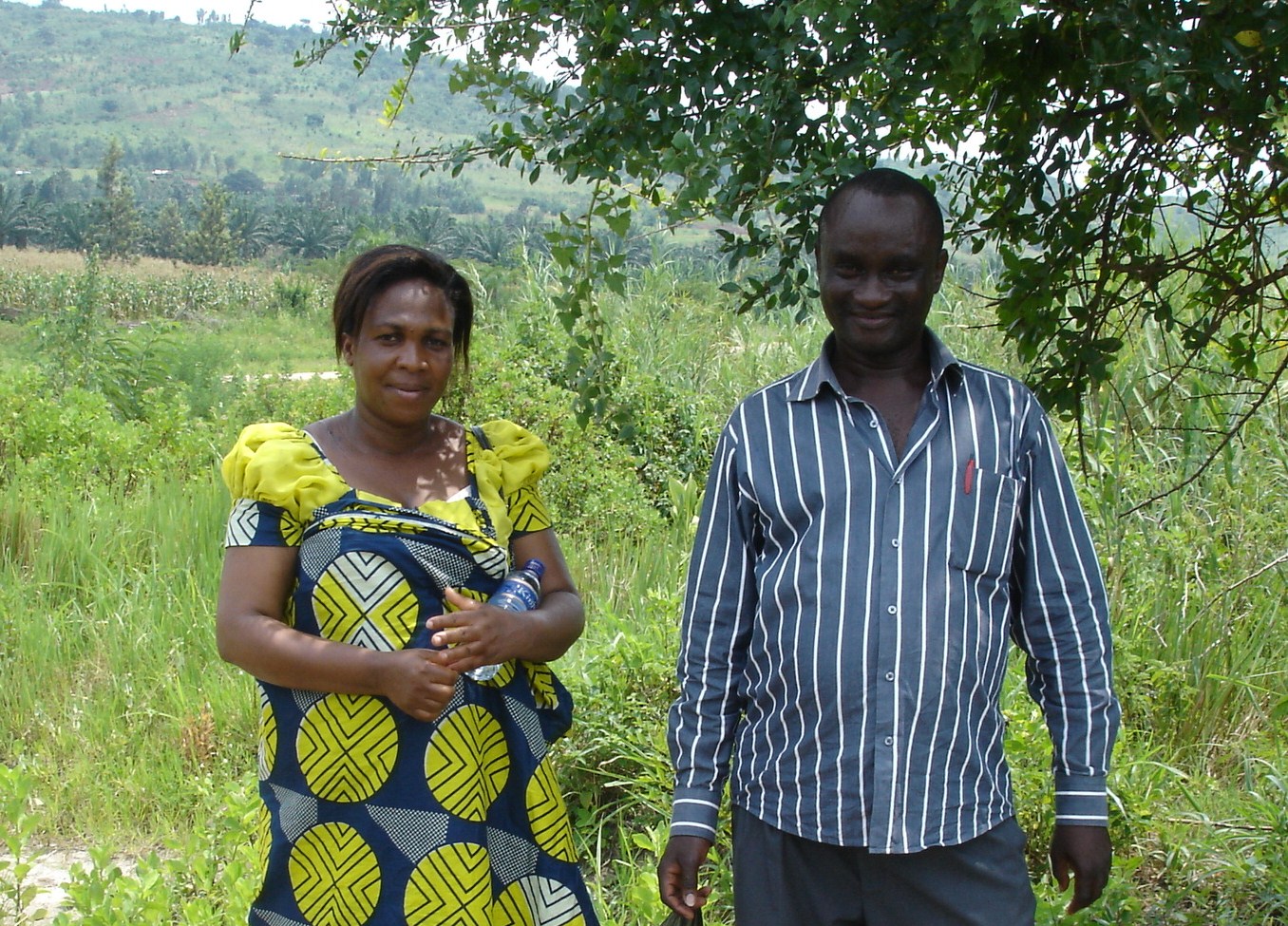
Maurice has five children and a friend suggested I give my camera to the kids for them to take pictures of the family at home. There were some
interesting results ...
Here are Maurie (11), Mauricette (8) and Morrisson (4), the second, third and forth children of the family. Maurine (16) is the first
child and doesn't live
with us as she goes to school outside of Bujumbura and the youngest, Mauro Franki, is just 3 months old (are you seeing the pattern with the names?).

In the same way that Maurine lives with other family members, Esta (13) is a cousin and also lives with us. Here Morrisson has snapped
her doing the washing ...

And this is Deo, one of the workers who lives with us. He seems to help out with pretty much anything and everything: cooking, cleaning,
fixing things, running errands, looking after the chickens ... Here he is making "ugali" which is a dough made of cassava flour and water. It is dipped in the sauce that accompanies most
Burundian meat and fish dishes (so actually I don't eat a lot of this!).
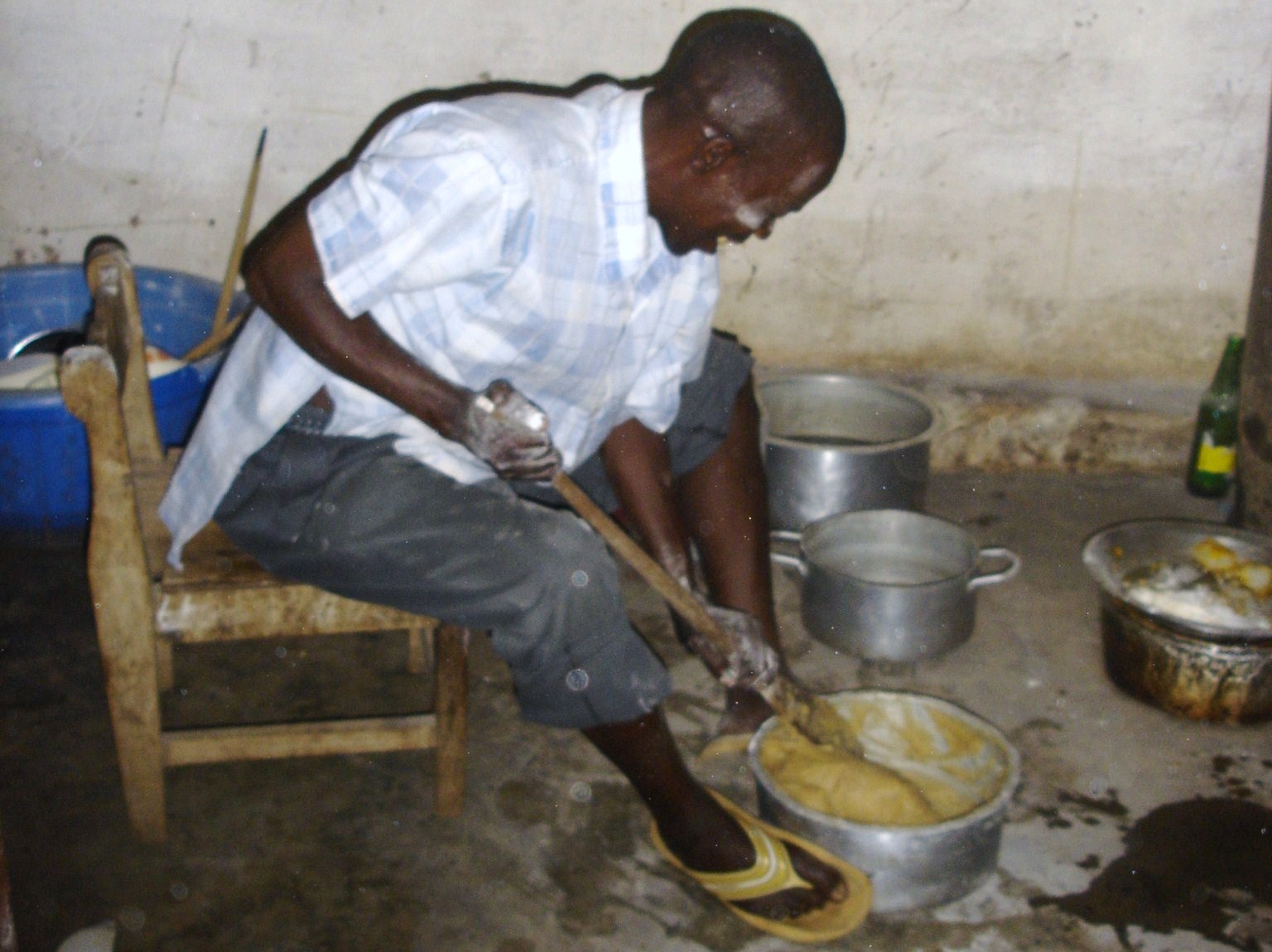
There are lots more people coming and going at home - family members, workers, friends - it took me a while to figure out who was who and
even now
new people keep appearing!
Next are the neighbours' children who never get bored of shouting "Mzungu" at me every time I walk by and
running over to shake my hand. I don't think they have their photos taken very often hence no one is smiling - I wish I had photos of their reactions
to seeing photos of themselves, they were so excited!
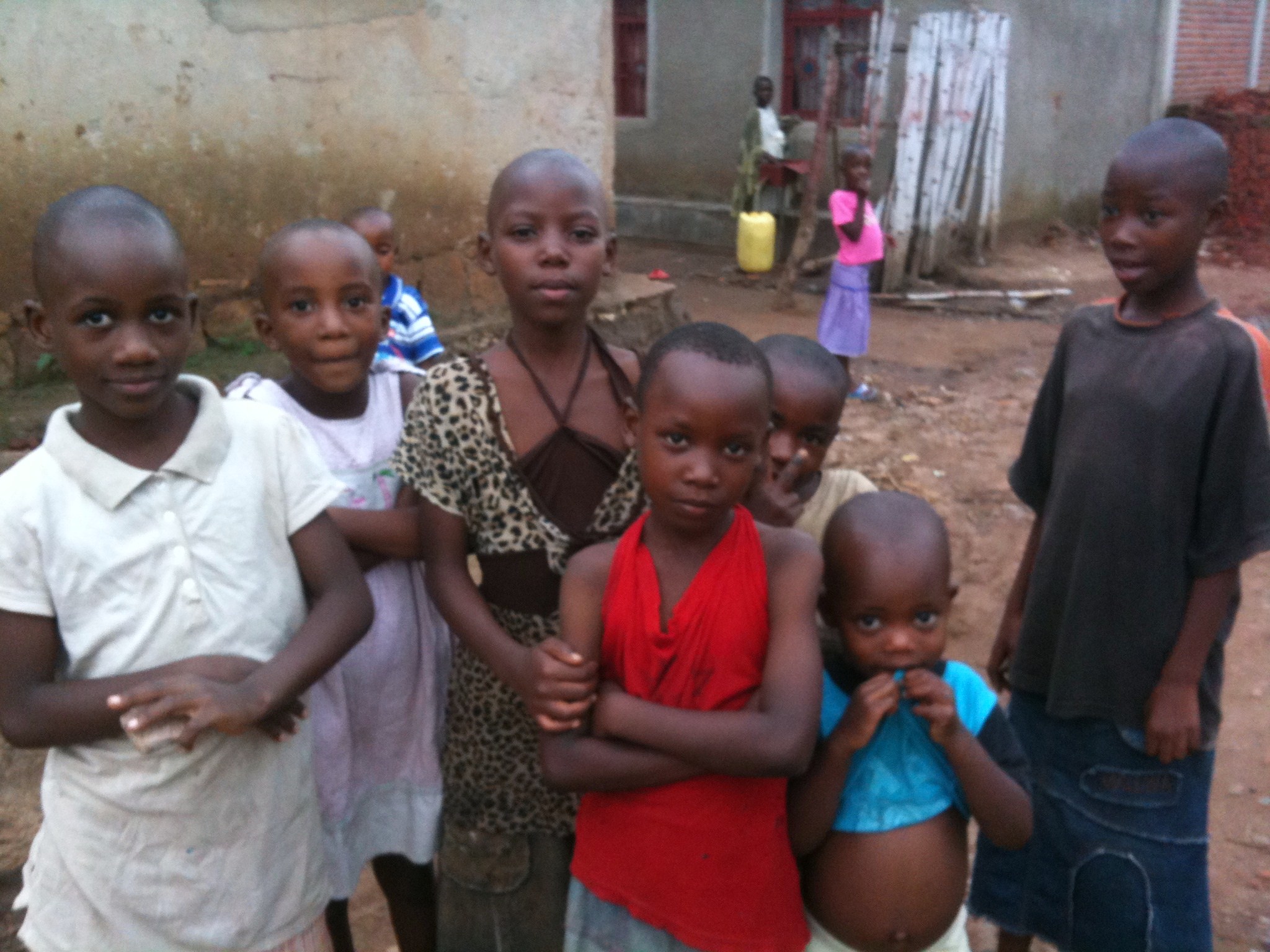
Kids running after us is quite common and if we are in a car it's even more exciting for them as they try to race us! Here are some doing
just that...

Then there are my two mzungu friends, Meghan and Rachael from the USA who are volunteering as teachers at the English school (the ones from the
waterfall). I have been informed
that whilst improvements have and are being made to the Burundian education system (only 75 kids per class compared to 100 in the past!) the
methods are still quite outdated and focused on learn and regurgitate rather than creativity and independent thinking. Meghan and Rachael are not
only teaching but demonstrating to the local teachers alternative teaching methods that will give the students both the knowledge and
skills they need to succeed in today's world.
I have so much more I want to say but I think I will leave it there for now. But you never know, I might be back with another update
sooner than you think!
11/02/2013:
Another three weeks has passed since my last update - apologies - I need to get a bit better at regular blogging!
For the accountants out there I thought I would give you a bit more info about what I am actually doing...
Basically its all about the cash controls at the moment. Petty cash is anything but petty; if income doesn't come from donors it's received
cash in hand, and payments are made by going to the bank with a cheque to be cashed (out of donor money) and put in the petty cash
from which pretty much everything is paid - even salaries in some cases - there are no direct debits, standing orders, credit/debit cards etc.
Good documentation of all these transactions was a bit sporadic when I got here but that has definitely improved so we are now able to do some
monthly reconciliations! (Although I'm having them do them every two weeks while I'm here so they get well practiced - one of the very few reasons
why they might not want me here!)
I am also showing them how to use some new software which should make the day to day accounting a lot easier as well as providing
them with useful information that will aid decision making. Next task is finalising the 2012 figures and revising the 2013 budgets once we have some accurate figures ...
OK that's the accounting bit over, onto something more interesting (unless you love accounting like me?!)...
I've experienced more extremes over the last three weeks; I've been to some 5-star beach clubs and fancy
cafes with wifi where the clientele definitely have cash to splash and I've been to a couple of rural communities where there was no electricity or
running water and I went to the loo in a mud hut standing over a hole in the ground! I didn't realise it at the time but I was told afterwards
that I was the first white person the children had ever seen that day - I felt quite privileged! I still find it difficult to comprehend that
people go about their daily lives without access to so much that we take for granted and it had made me question what we actually need to lead a
comfortable, healthy and happy life.
I've also been thinking about what actually constitutes development and how measures taken to solve one
problem can just create another one, for example in Burundi health care for pregnant women and children under 5 has been free since 2005 and apparently this has lead
to a reduction in deaths both for the chid and mother. Great! But it has also lead to a huge population increase as people have seen it as an incentive
to have more children - the average family here has maybe 7 children!
In my opinion pollution is also a big problem in Burundi - I've said before its
a beautiful country but packaging, wrappers, bottles etc. line the streets and public beaches, vehicles produce clouds of brown smoke and
depending on where you are, used water just runs down the street. It's great that people here have access to western
consumables and vehicles etc. but if we provide this stuff we should also help the local population deal with
the consequences of ownership before they become a problem.
Just in case you need more photos to see how beautiful it is ...

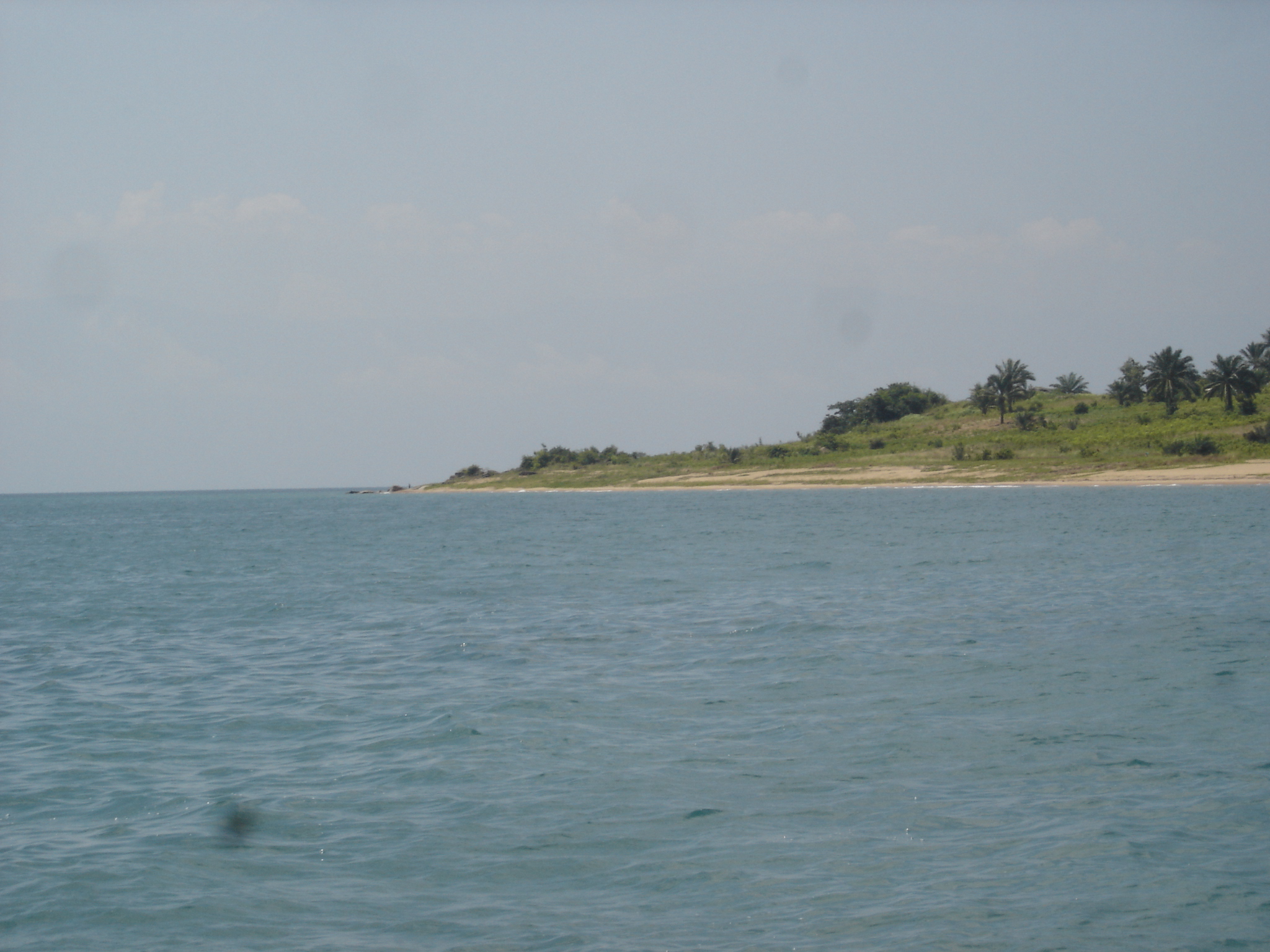
Just a few thoughts for you there, onto something a bit more light-hearted ...
Bujumbura itself is quite small so to get around so I walk quite a lot and I've started taking the minibuses which always seems to either delight
or surprise the locals. At the beginning I felt like getting the minibus was dicing with death as often they don't shut the door and they really
don't look, sound or smell like they would pass an MOT but then I got a taxi-moto one day ...
As the name suggests, it's a motorbike taxi - you flag
one down, jump on the back in whatever you are wearing, put on a helmet if you are lucky and off you go. I wasn't lucky and didn't get a helmet
(sorry Dad) but then I wasn't on the main roads either, I was heading up a dirt track to visit someone in the hills surrounding Bujumbura. I have to
admit that it was pretty thrilling speeding up into the mountain on the back of the bike - the same way that a rollercoaster ride is thrilling, except
with a rollercoaster you feel quite safe but on the bike I was clinging on to my driver for my life!
Finally for this instalment, I will leave you with a few pictures of places I have been to about which the Foreign Office says this:
"Burundi is assessed as medium risk for travel, however within the country there are a number of areas with elevated risk levels. It
is advisable to avoid all but business-critical travel to the provinces of Cibitoke and Bubanza, as well as the suburbs of Bujumbura.
If travel is essential, high-level security arrangements and possibly an army escort should accompany travellers. Additionally
cross-border incursions by guerrilla groups continue to occur along borders with Congo (DRC)."
Visiting the hot springs in Cibitoke province. See the water bubbling away? It comes out too hot to put your hand in!
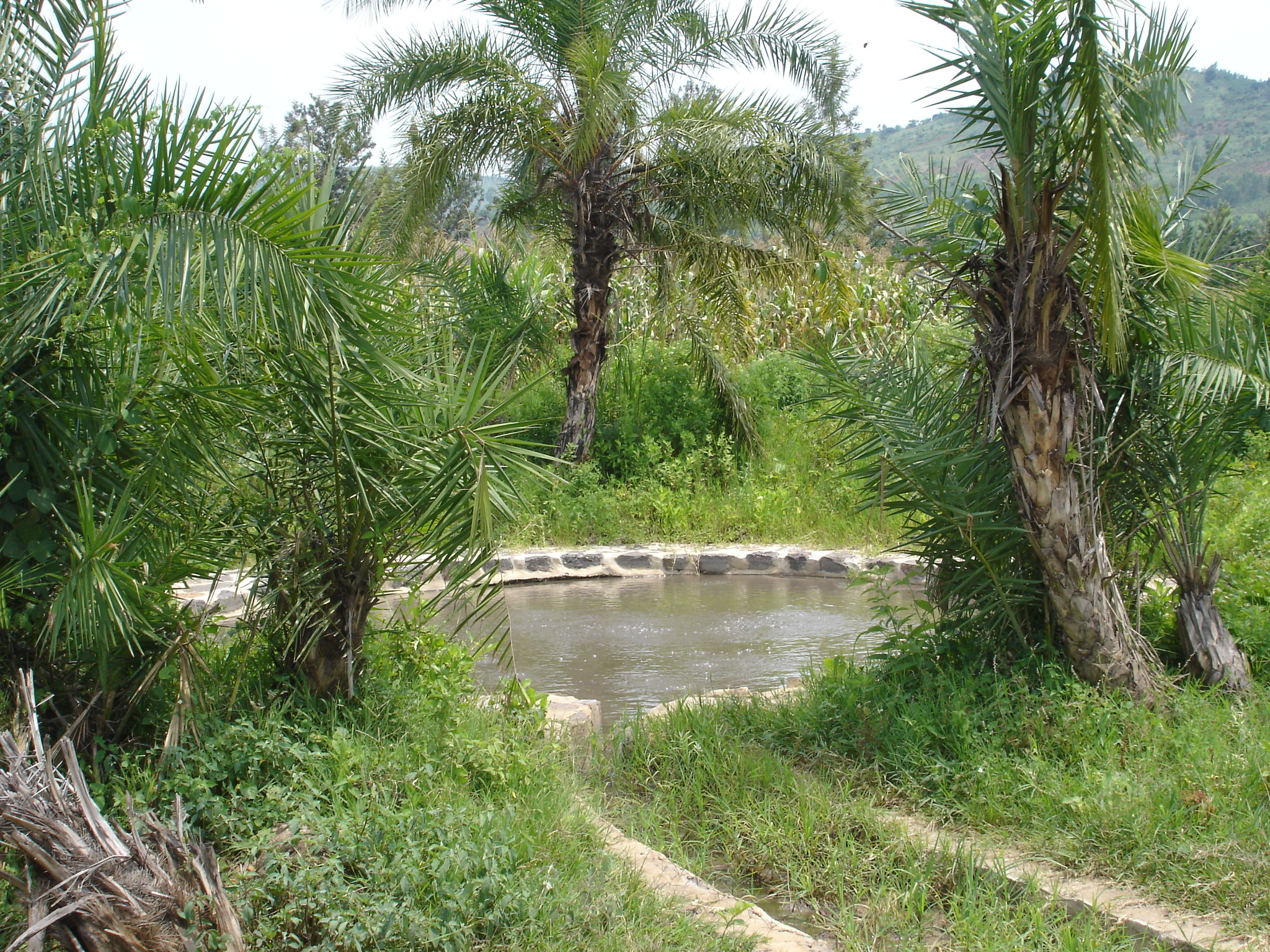
Trip to the border with the DRC, just to see it really!
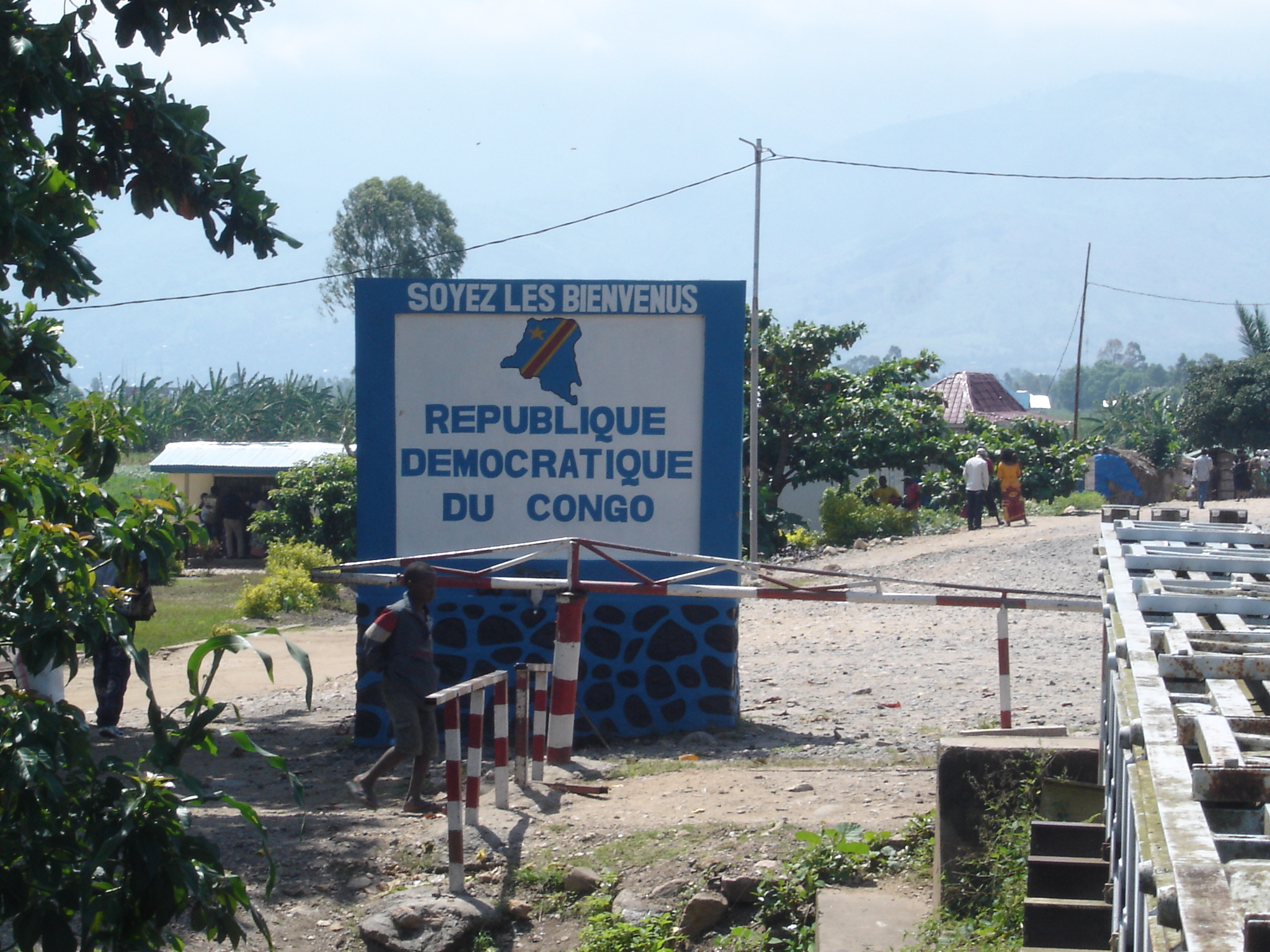
Looking back at Bujumbura from a village in the surrounding hills.

Some wildlife on the way to the Blind school in Bubanza province - the birds here are amazing!
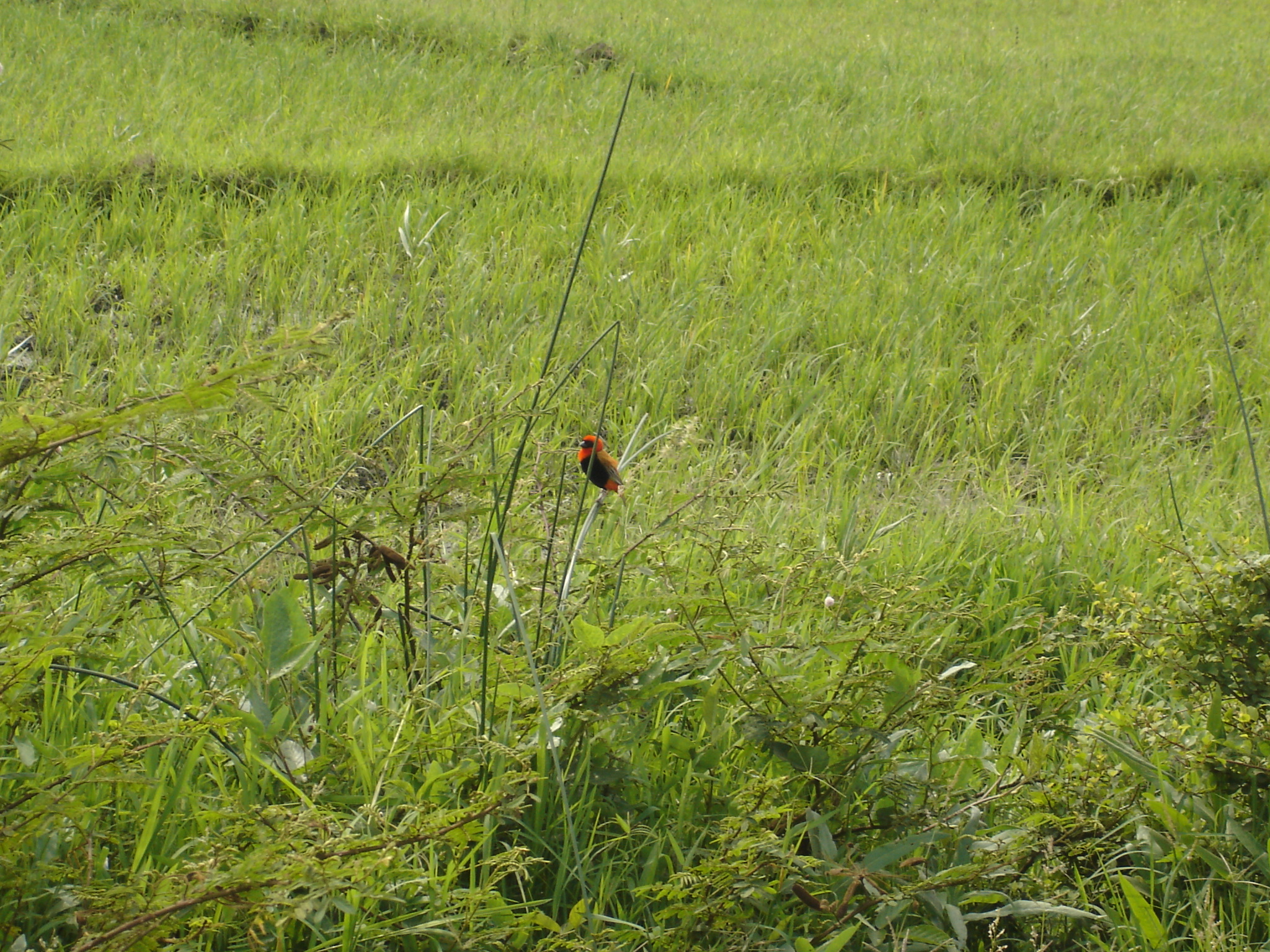
No army escort was needed you'll be pleased to hear!
22/01/2013:
Mwaramutse!
I've been in Bujumbura for over three weeks now so it's about time I told you how things are going ...
I started 2013 with a stroll along the beach with my Burundian family; Bujumbura is on the shore of Lake Tanganika (the world's longest
freshwater lake and the second deepest). I didn't make it any deeper than a paddle on this occaision as apparently there are crocodiles and hippos
in there, not that that stops the locals from going in for a swim!
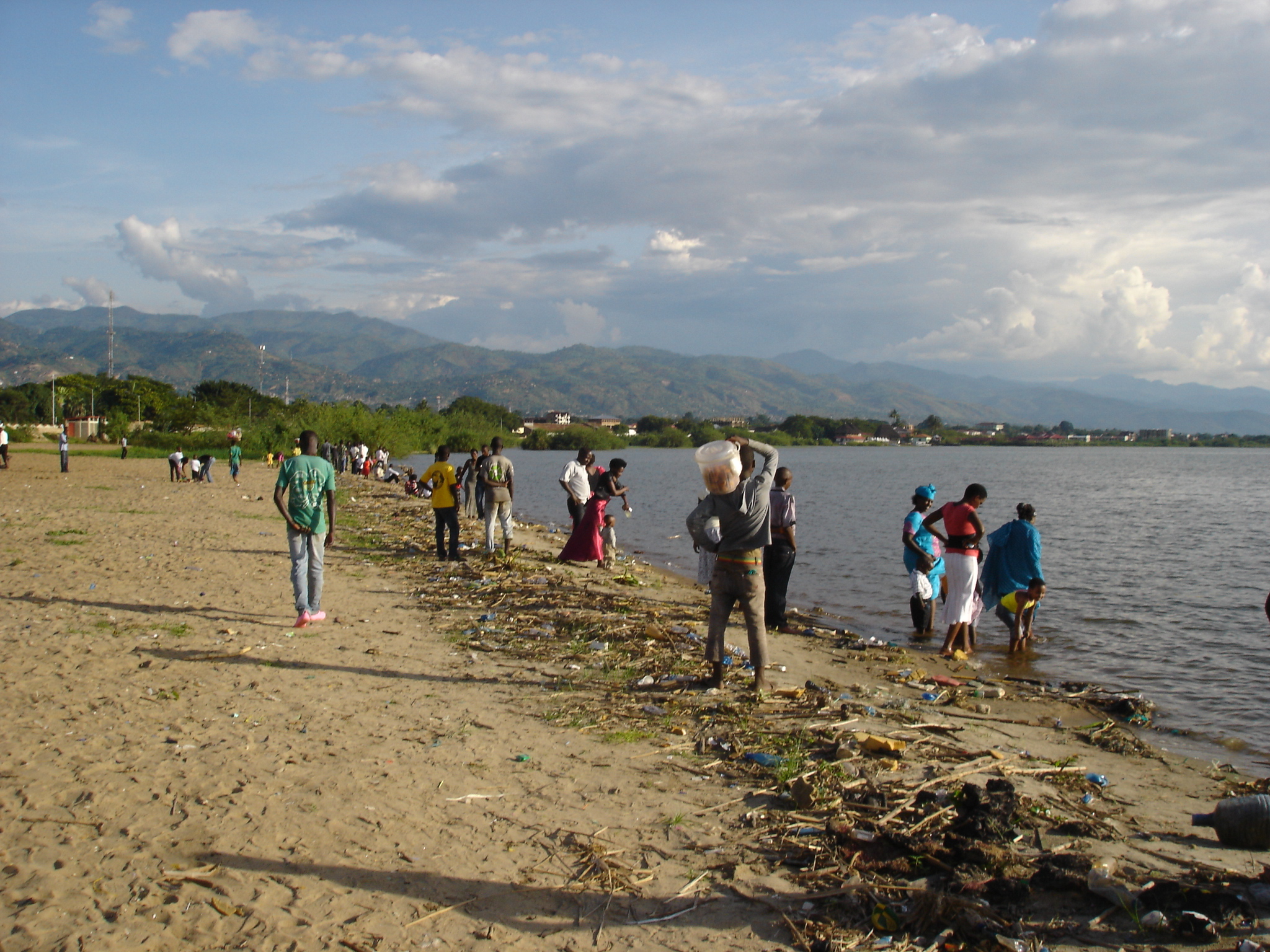

The family I am staying with live in the suburbs of the city, just a short walk away from the school. Suburbs here are quite different from
UK suburbia, here are a couple of pictures from my walk to work ...

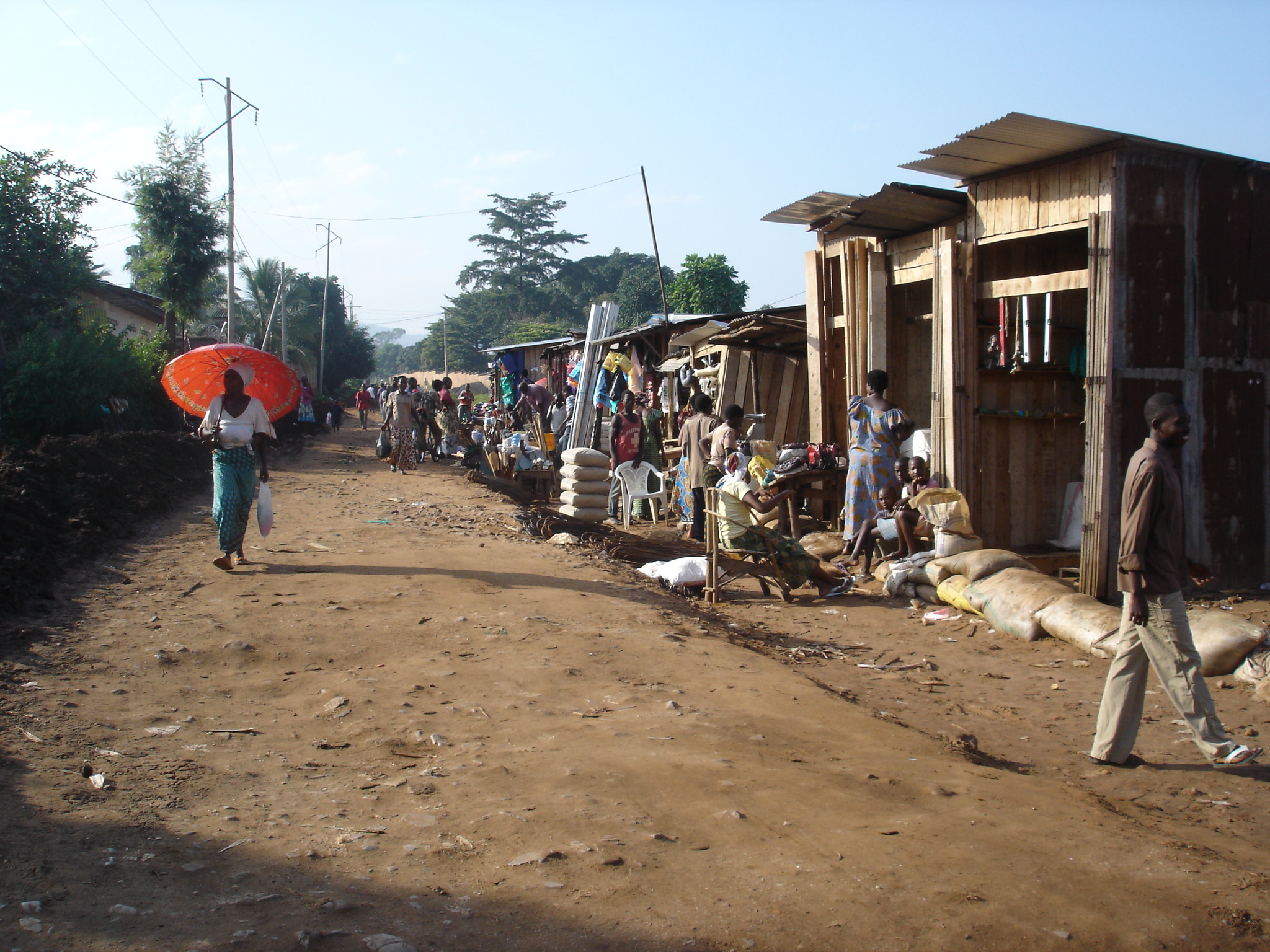
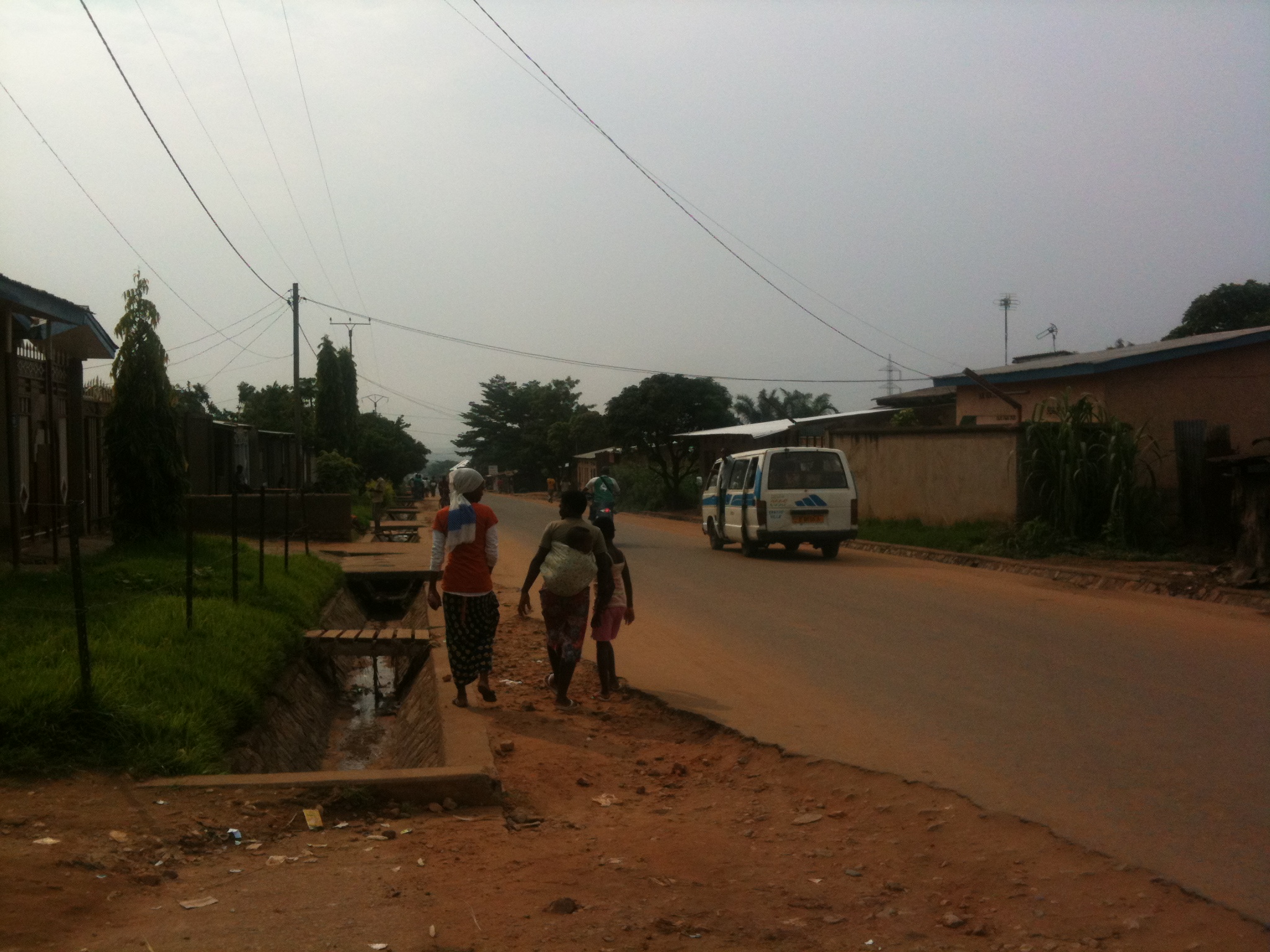
There is a lot of work to be done and it's difficult to drag me away from it at the end of each day!
Ephphatha School is part of a number of projects run by the Emmanuel Church and I am now also helping with the
accounting at the Kanura School for the Blind, the Discovery English School, the Ophthalmological Centre and the Church administration.
I hope I manage to get everything done!
This week is Olympic week at the school - a couple from the USA come over to Burundi every year and organise activities for the children;
this year they have brought sports equipment with them and are doing obstacle courses, races and many other challenges that the children
do not usually get to do. Here are a few photos of the fun ...
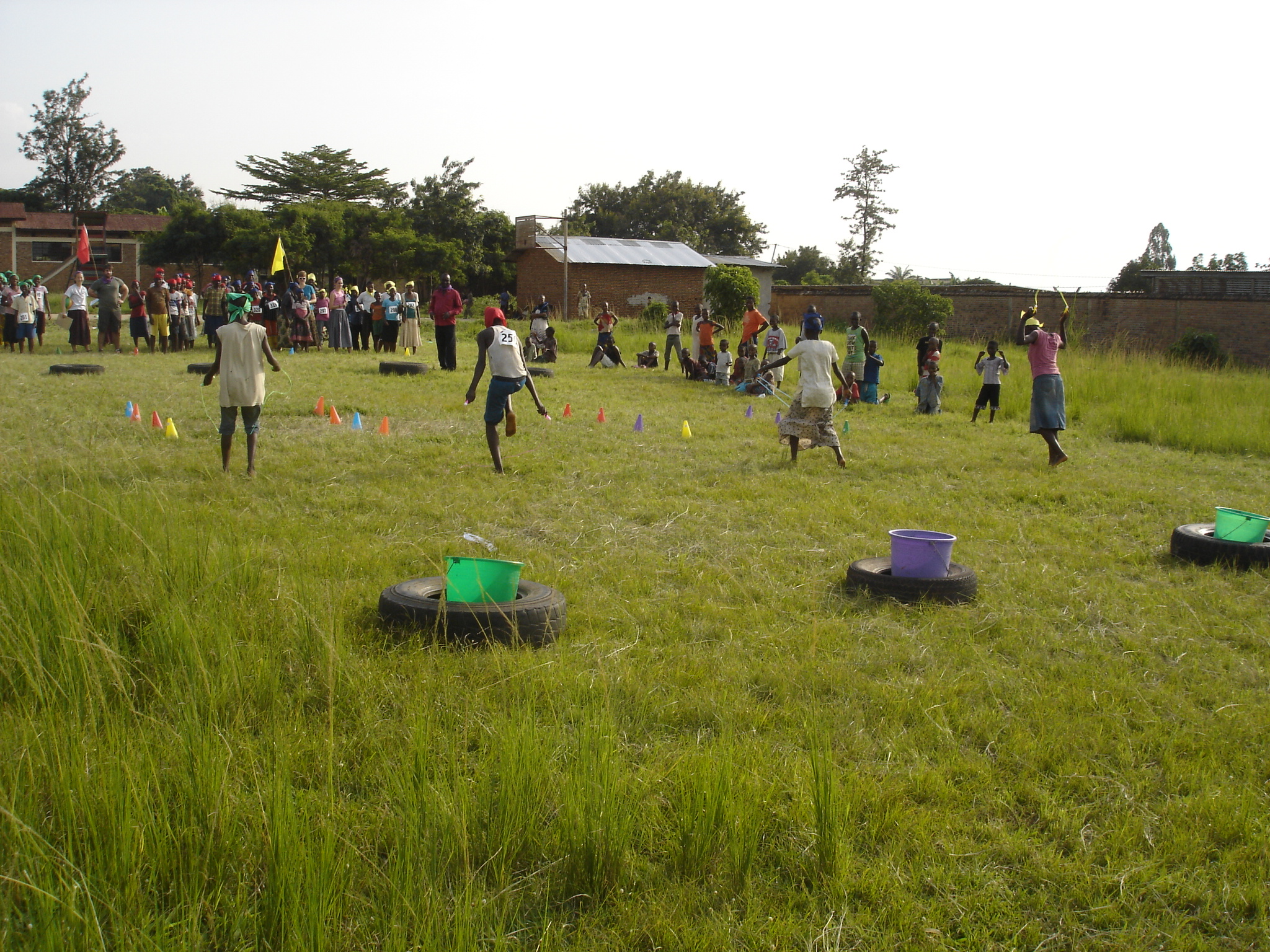
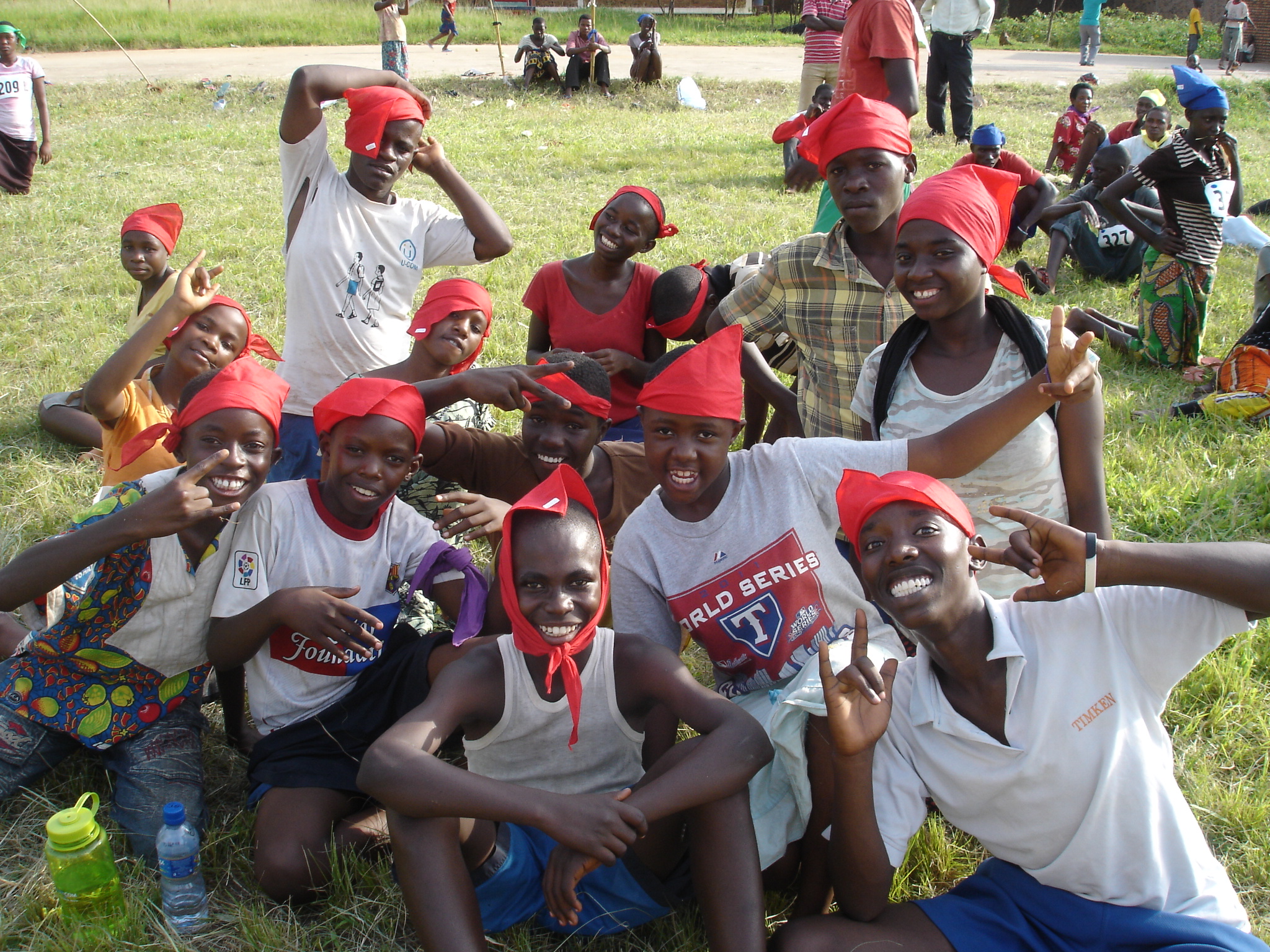
There's lots to do outside of work as well; besides going to the beach (which is always a good option as beach clubs generally have wifi) I
have been to the local nature park to see the imfamous lake hippos rather than waiting to meet one when I'm out swimming.
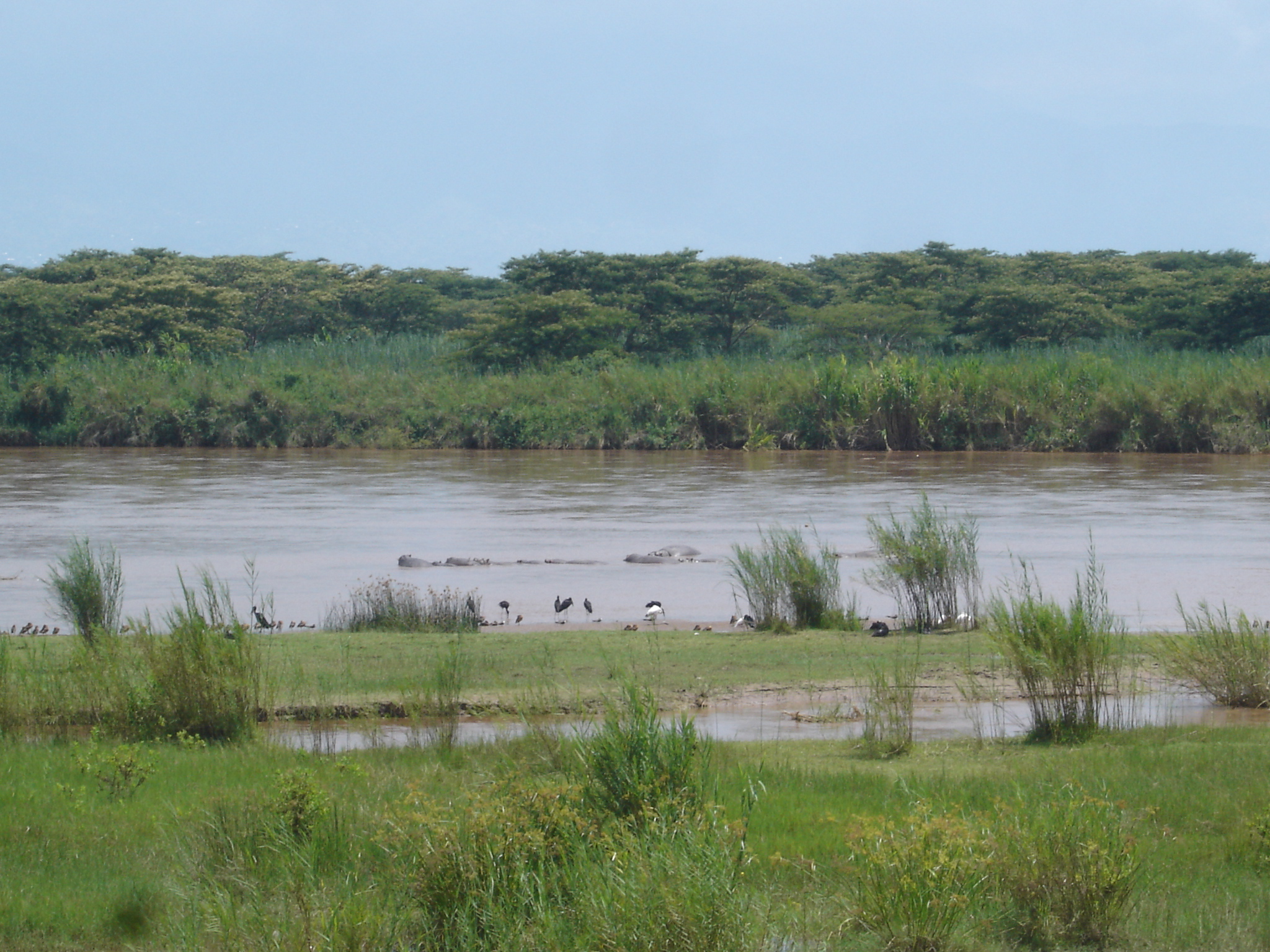
There is also a mini
zoo with crocodiles and snakes mainly; this was a bit of a traumatic experience firstly as half the snake houses have smashed glass and are empty so
I was half expecting a rogue snake to jump out and attack me and secondly the crocodiles are fed live rabbits - I didn't watch but
I heard the squeals!
Then there is the nightlife! Yes there are restaurants, bars and clubs! Burundians love eating, dancing, singing and drinking the locally brewed beer
so its no surprise that there is a nightlife, although it does feel like a very different world when I go out in
the evenings compared to when I'm at work - its definately not something that most of the population have access to.
Lots of people asked me before I left whether I would give up my vegan principals once I was out here.
Well actually the African diet is pretty awesome for vegans: lots of rice, peas, beans, spinach, sweet potato, bananas, avocado, mango ... Plus
I have a wedge of my Dad's Christmas cake that I am nibling on when I fancy something from home! Unsurprisingly the fact that I
choose not to eat meat etc. is lost on people out here!
There are a couple of things that are taking a bit of getting used to; firstly power cuts - I knew there would be regular power cuts before
I arrived but I didn't appreciate that they would be daily and often last 8 hours or more! Some are scheduled which makes planning a bit easier but some
just happen! Secondly is the traffic - I usually fear for my life and the lives of those around me whenever I am
even near a road! Everyone just goes anywhere - cars, buses, cyclists, motorcyclists and pedestrians - all seemingly oblivious to the others.
Thirdly is no hot water and sometimes no running water, but now I know that I am perfectly
capable of washing (hair included) with a bar of soap and a bucket of cold water!
I could carry on as there is already so much to say and I have only just scratched the surface. Burundi
is a beautiful country of mountains, forests and beaches, and the people are exceptionnally welcoming. But there is a tragic recent
history of ethnic conflict (often overlooked due to the notoriety of its neighbours Rwanda and the DRC) which has stifled development
and left the country struggling as the world's 4th poorest country according to the UN. Since the elections in 2010 Burundi has been peaceful and
areas of the country that were once off limits are opening again, infrastructure and business is developing in the capital and the government
has made big improvements to primary education. There are still many challenges ahead but Burundians seem hopeful - the developed world mustn't
turn its back on this little country!
I hear the snow back in the UK is causing the usual havoc - I hope everyone is OK and I won't mention the heat I
am experiencing here! Until next time ...
Turabonanye!
27/12/2012:
Tomorrow I will be on my way to Bujumbura, Burundi,
where I will be volunteering at the Ephphatha School for Deaf Children for three months.

My role will become more apparent once I arrive but the general idea is that I will be assisting the school's
finance officer with preparing accounts, implementing new accounting software and improving processes and controls so that funds are
managed effectively. The aim is to share my accounting knowledge and experience with a view to ultimately making the
presence of a volunteer redundant.
I will post here regularly (electricity and internet permitting) on what I get up to so check back each week or so to find out
more about life in Burundi. If you want to get in touch with me then
click here.
But until then, here is a bit of info about the school ...
Ephphatha school provides primary education
for approximately 127 deaf/hearing impaired children together with a bridging class aimed at preparing older deaf children for the
possibility of transferring to mainstream government secondary ‘hearing’ schools. For older children who are not able to enter mainstream
education, the school provides vocational training for example in sewing and carpentry.
Currently there is no government provision of education for deaf/hearing impaired children, the school is one of only two in the country
and is funded entirely through charitable donations and a small egg production project that has been set up recently to supplement income as
well as feed the children.
At this point I should mention how my trip came about and say a big thank you to the great team at Accounting for International Development
who made it all happen and to my employer KPMG for being very supportive in giving me the time to do this.
AFID is an award winning social enterprise that offers finance professionals the opportunity to use their skills to make a
genuine difference as volunteers and to gain hands-on international development experience.
If you are interested in finding out more then do check out their website: www.afid.org.uk
